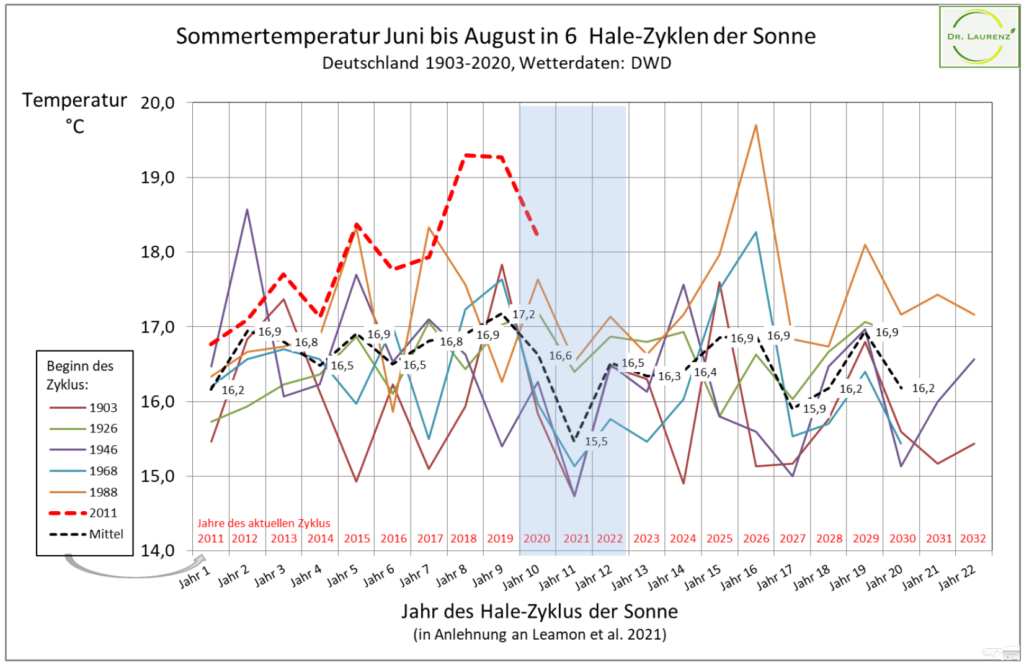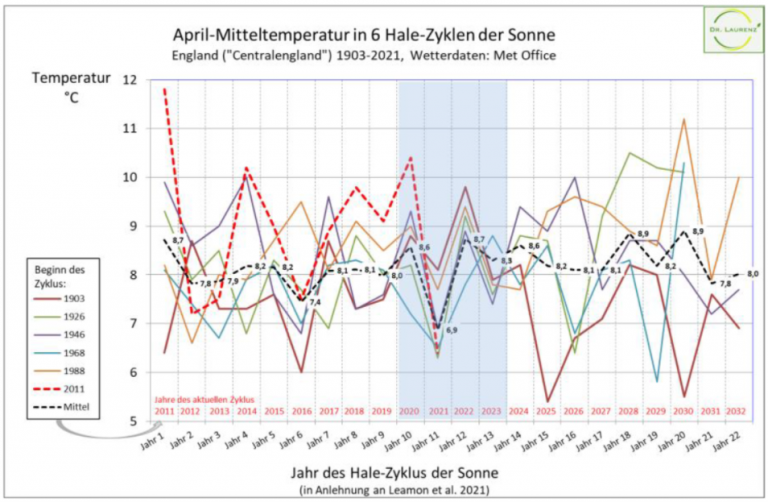Significant influence of solar activity on winter temperature in Scandinavian polar night
So far, much of Europe has seen a cold and wet 2021. It may be related to solar cycles.
An essay at Die kalte Sonne by Dr. Ludger Laurenz looks at the relationship between solar activity and weather trends, and believes this summer’s temperature will be 1.5°C lower.
There are many scientific opinions about solar activity’s impact on weather and climate, which differ and contradict each other. For example, a new publication by Leamon et al. provides an important building block for uncovering solar influence. Background here.
Solar influence in historical climate data substantiated
In the Leamon et al publication, the authors looked at the 22-year Hale solar cycles and saw it is possible to detect and substantiate solar influence in historical climate data (from tropical ocean surface temperature to temperature, sunshine, and precipitation data) and to make quantitative statements about the influence of solar activity on weather data.
Norway winter temperature and sun: “high statistical significance”
“Using the alternating years between Hale cycles, a correlation between the 22-year Hale cycle of the Sun and the trend of winter temperature in the polar night of Norway can be demonstrated with high statistical significance,” Dr Laurenz adds.
“Parallel to the temperature trend, the solar influence of the Hale cycles is also evident in the index values of the North Atlantic and Arctic Oscillations,” says Laurenz in addition. “Evidence of the influence of solar activity in the polar night of Scandinavia demonstrates that differences in solar activity are transmitted to the near-surface temperature via amplification mechanisms such as change in circulation patterns in the North Atlantic and Arctic Oscillations.”
The sun’s role in weather patterns is a great significance, and so CO2 is not the main driver at all.
Cool summer 2021 for Central Europe?
Laurenz also says that with the help of the 22-year Hale cycles, “it can be demonstrated that the current spring cold in Central and Western Europe is influenced by solar activity” and that for the summer of 2021,” a rather cool temperature can also be expected because the summer temperature in the last 6 Hale cycles since 1900, especially in cycle year 11, which includes 2021, is by law about 1.5 °C lower than in the cycle years before.”
“The prospects for the summer 2021 in Germany are rather subcooled from the point of view of the solar activity,” Laurenz writes in his essay. “In the last 6 Hale cycles since 1900, not only April was subcooled in year 11 of the Hale cycle, which also includes 2021, but also the summer, see Fig. 9”:

Figure 9: Summer temperature trend in Germany during the last six 22-year Hale cycles since 1903. Image source: Laurenz.
Laurenz also look at Central England:
The temperature trend this summer will be very exciting. Will the summer temperature drop by only 1.5 °C in sync with the mean, or will the temperature plummet by 4°C, as in Figure 8 for the April temperature in Central England?”
Figure 8: Last six 22-year Hale cycles plotted showing April mean temperature as a function of the Hale cycle year. They suggest a cool summer for England in 2021.Image source: Laurenz.
Laurenz adds further:
Statistically significant correlations between solar activity and temperature have been demonstrated in this paper. In a follow-up article, the relationship between solar activity and sunshine duration and precipitation activity in Germany will be uncovered, and it will be hypothesized that the occurrence of drought correlates with solar activity, as it has over the past three years.”
Sources:
- Robert J. Leamon et al. (Feb. 2021) Termination of Solar Cycles and Correlated Tropospheric Variability, doi.org/10.1029/2020EA001223
- Ronan Connolly et al. (June 2021): How much has the Sun influenced Northern Hemisphere temperature trends? An ongoing debate, Research in Astronomy and Astrophysics
- Laurenz L, Lüdecke H-J and Lüning S (2019), Influence of solar activity changes on European rainfall, Journal of Atmospheric and Solar-Terrestrial Physics 185 29–42, doi.org/10.1016/j.jastp.2019.01.012
- Laurenz L, (2021): kaltesonne.de/hypothese-einfluss-der-sonnenaktivitaet-auf-den-regen-in-deutschland-viel-groesser-als-bisher-gedacht/#more-63293






Note that Leamon works at the Goddard Planetary Heliophysics Institute, University of Maryland-Baltimore County, Baltimore, MD, USA.
As a US taxpayer, I’m relieved to see that although NASA produces plenty of climate science rubbish, it also produces good stuff in this field.
”…although NASA produces plenty of climate science rubbish, it also produces good stuff in this field. – ledag
Yes. They haven’t been totally corrupted. That is a source of some hope.
[…] Zdroj: https://notrickszone.com/2021/05/30/likelihood-of-a-sub-cooled-summer-for-europe-in-2021-hale-solar-… […]
If I were to put sand on the diesel tanks of of the Rainbow Warrior would that be “shrewd”? Would they seek recourse in the courts?